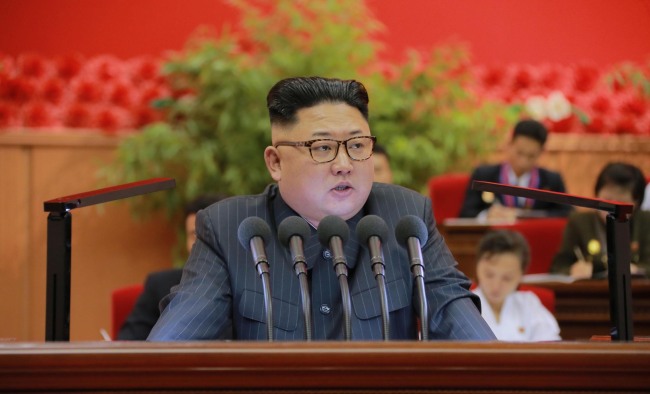North Korean leader Kim Jong-un is facing difficulty in securing funds needed to govern the country as tougher international sanctions have affected the inflow of hard currency, South Korea's pointman on unification said Tuesday.
Unification Minister Hong Yong-pyo also said that a series of defections by North Koreans, including senior diplomat Thae Yong-ho, seem to be the result of tough UN Security Council sanctions imposed on the North.
 |
North Korean leader Kim Jung-un (Yonhap) |
"It is hard to exactly grasp the situation, but North Korea's governing funds are on the decline and (the North's leadership including Kim) is under pressure," Hong told Yonhap News Agency during his visit to Kazakhstan.
On March 2, the UNSC slapped its toughest ever sanctions to date on Pyongyang after the reclusive regime detonated its nuclear device and fired off a long-range rocket launch earlier in the year.
"North Korea claims that the sanctions have dealt a blow to the lives of ordinary people, but in reality, Pyongyang is seen as having difficulty in managing the regime (due to the sanctions)," Hong said of his assessment of the impact of the UN sanctions.
He said that the sanctions also seem to encourage more North Koreans to flee the repressive regime as they are under high pressure to provide money to the regime.
North Korea has sent more than 50,000 workers abroad, mainly in China and Russia, as it seeks to obtain dollars to avert economic hardship under heavy UN sanctions, according to a UN report.
Pyongyang is suspected of using the money to bankroll its nuclear and missile programs.
Thae, a former minister of the North Korean embassy in London, has recently defected to South Korea, making him one of the highest ranking North Korean officials to have defected to Seoul.
"As Thae's defection shows, North Korea is undergoing a shortage of cash and is pressing overseas workers to repatriate money," he said.
President Park Geun-hye said last week that possible unrest in Pyongyang can take place amid signs of serious "cracks" in the North. Her remarks stoked speculation that the goal of South Korea's inter-Korean policy may be shifting towards a North Korean regime change.
The minister rejected such speculation, saying that the government cannot implement its North Korean policy in such a way.
"If North Korea sticks to nuclear weapons, the country will face deeper isolation. So that's why we are calling on North Korea to give up its nuke programs and return to the international community," he added. (Yonhap)





![[Exclusive] Hyundai Mobis eyes closer ties with BYD](http://res.heraldm.com/phpwas/restmb_idxmake.php?idx=644&simg=/content/image/2024/11/25/20241125050044_0.jpg)
![[Herald Review] 'Gangnam B-Side' combines social realism with masterful suspense, performance](http://res.heraldm.com/phpwas/restmb_idxmake.php?idx=644&simg=/content/image/2024/11/25/20241125050072_0.jpg)

